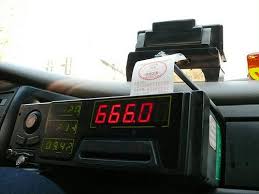Since around May this year, there have been a number of
reports on the manner in which the tourist-taxi system in Goa works. This
attention has been ensured thanks to the reportedly aggressive behavior by the
taxi-operators (taxistas), by their
request to the government to handle the disputes between the taxi-operator
associations in North and South Goa, and the demand by a variety of organizations
to ensure that the operation of these taxis is regulated by meters in these
taxis.
 Given that the taxi system could, and must, operate as a
viable supplement to the public transport system in our state, it would be in
our best interest to ensure that this segment of the public transport system is
well-regulated and accessible to all. Having said this however, it is also
necessary to assert that one cannot ensure the fair and honest resolution of a
problem by demonizing one party and laying all of the blame at their feet. This
is exactly what seems to be happening however, via the various newspaper
reports, where it is the taxistas alone
who are being faulted as being exploitative, demanding ridiculously exorbitant
charges, as well as violently aggressive towards their customers.
Given that the taxi system could, and must, operate as a
viable supplement to the public transport system in our state, it would be in
our best interest to ensure that this segment of the public transport system is
well-regulated and accessible to all. Having said this however, it is also
necessary to assert that one cannot ensure the fair and honest resolution of a
problem by demonizing one party and laying all of the blame at their feet. This
is exactly what seems to be happening however, via the various newspaper
reports, where it is the taxistas alone
who are being faulted as being exploitative, demanding ridiculously exorbitant
charges, as well as violently aggressive towards their customers.
 The aim of this column is to suggest a more sympathetic
viewing of the taxistas, one that
moves away from demonizing them, so that we could move toward a just resolution
of the problem. As such, the first task would be to question whether the manner
in which we view the taxistas is not
in fact tinted by class-based prejudices. A recent article in The Goan allows us to place this
possibility in context, given that it uses two highly inappropriate words,
mafia and gangs, for the informal associations of the taxistas. These words demonstrate the manner in which these groups
are not only being demonized but are effectively being criminalized. It is not
surprising that these adjectives were being used for groups from South Goa
given that there is a long Goan history of depicting the working class Saxticar
as unthinking, hot-headed and violent. Every major Goan population has relied
on the mass mobilization of Saxticars, but simultaneously has cast them as mobs
without political savvy, setting in process this tendency to criminalize the
Saxticar. This may also have to do with the kind of class-relations that marked
colonial Salcette, given the large landholdings in that taluka, the unequal and
oppressive relations between landlords and tenants, the tendency for the
dominant class to see the genuine demands of the tenant class as illegitimate,
and a situation where there was largely no option for the tenant but to
acquiesce or revolt.
The aim of this column is to suggest a more sympathetic
viewing of the taxistas, one that
moves away from demonizing them, so that we could move toward a just resolution
of the problem. As such, the first task would be to question whether the manner
in which we view the taxistas is not
in fact tinted by class-based prejudices. A recent article in The Goan allows us to place this
possibility in context, given that it uses two highly inappropriate words,
mafia and gangs, for the informal associations of the taxistas. These words demonstrate the manner in which these groups
are not only being demonized but are effectively being criminalized. It is not
surprising that these adjectives were being used for groups from South Goa
given that there is a long Goan history of depicting the working class Saxticar
as unthinking, hot-headed and violent. Every major Goan population has relied
on the mass mobilization of Saxticars, but simultaneously has cast them as mobs
without political savvy, setting in process this tendency to criminalize the
Saxticar. This may also have to do with the kind of class-relations that marked
colonial Salcette, given the large landholdings in that taluka, the unequal and
oppressive relations between landlords and tenants, the tendency for the
dominant class to see the genuine demands of the tenant class as illegitimate,
and a situation where there was largely no option for the tenant but to
acquiesce or revolt.
 The article in The Goan,
indicates that there are clashes between the various taxista groups in South
Goa, where for example the taxistas
in Margão, prevent taxistas
from outside the city to operate, but while doing also locates a good reason
for this behavior. This tabloid indicates that the State has thus far been
remarkably absent in regulating the taxi-system, whether it is among legitimate
taxi-operators, or private vehicles operating as taxis. In the absence of a
fair and constant regulative presence therefore, it is little wonder that the
field of taxistas has turned into the
free-for-all that is being reported. Anecdotal observations further indicate
that this free-for-all is also the result of the manner in which the State and
elected representatives over time have, in the process of creating vote-banks,
in fact created the problem by indiscriminately making available more cars for
use as cabs, than the market is able to support. Given this situation of excess
supply, it is little wonder that the taxistas
are keen to ensure that they make as much money from their customers as they
can.
The article in The Goan,
indicates that there are clashes between the various taxista groups in South
Goa, where for example the taxistas
in Margão, prevent taxistas
from outside the city to operate, but while doing also locates a good reason
for this behavior. This tabloid indicates that the State has thus far been
remarkably absent in regulating the taxi-system, whether it is among legitimate
taxi-operators, or private vehicles operating as taxis. In the absence of a
fair and constant regulative presence therefore, it is little wonder that the
field of taxistas has turned into the
free-for-all that is being reported. Anecdotal observations further indicate
that this free-for-all is also the result of the manner in which the State and
elected representatives over time have, in the process of creating vote-banks,
in fact created the problem by indiscriminately making available more cars for
use as cabs, than the market is able to support. Given this situation of excess
supply, it is little wonder that the taxistas
are keen to ensure that they make as much money from their customers as they
can.

Furthermore, while there have been many stories that present
the customers as the victims of the predatory taxistas (as no doubt a good number may be), we must also place
this plaint in perspective. As Jorge Fernandes, spokesperson for the South Goa
Registered Tourist Taxi Association spokesperson is reported to have said “…
without a formal meter, it’s the tourists that loot the local taxi operators
and not the other way round as propagated by few vested interested people”.
Bear in mind that it is not only the middle-class (whether Indian, or Goan)
customers who are used to browbeating service providers into the cheapest
possible deal, but also the tourists who visit Goa, who are famously known to
have perfected skills of bargaining to ensure that services are offered at unsustainable
rates.
 What also bears comments, is that there is also something
odious about the suggestions that are being made, and accepted by the taxista associations, of etiquette classes that the taxistas need toattend. It would be great if the taxistas
were able to attend courses that would provide them a greater sense of the
world, the nuances of the multiple social orders that they cater to, and the
social skills required to do so. However, we shold ensure that such a program
does not begin from the assumption that the taxistas
in themselves are lacking. Such a course should not slip into one that urges
taxi-drivers to wear shoes and socks, and perhaps prompting them to open doors
for customers once they reach their destination. Such course content would emphatically
NOT be about etiquette. It would be a class-based, Hollywood-fantasy inspired, desire
of elitist segments of our society to convert service providers into servants.
If the Goan taxista has a sense of
self-worth that makes him (since it is invariably a him) feel that the customer
should also acclimatize to their sensibilities then we should in fact recognize
that it has been this sense of self-worth that has even from colonial times
marked off the Goan as different and special in the subcontinent. Where
providing a taxi service is a way out of many individuals and families from
earlier feudal relationships, we cannot in the process of upgrading the
industry, push these groups back into conditions of servitude
What also bears comments, is that there is also something
odious about the suggestions that are being made, and accepted by the taxista associations, of etiquette classes that the taxistas need toattend. It would be great if the taxistas
were able to attend courses that would provide them a greater sense of the
world, the nuances of the multiple social orders that they cater to, and the
social skills required to do so. However, we shold ensure that such a program
does not begin from the assumption that the taxistas
in themselves are lacking. Such a course should not slip into one that urges
taxi-drivers to wear shoes and socks, and perhaps prompting them to open doors
for customers once they reach their destination. Such course content would emphatically
NOT be about etiquette. It would be a class-based, Hollywood-fantasy inspired, desire
of elitist segments of our society to convert service providers into servants.
If the Goan taxista has a sense of
self-worth that makes him (since it is invariably a him) feel that the customer
should also acclimatize to their sensibilities then we should in fact recognize
that it has been this sense of self-worth that has even from colonial times
marked off the Goan as different and special in the subcontinent. Where
providing a taxi service is a way out of many individuals and families from
earlier feudal relationships, we cannot in the process of upgrading the
industry, push these groups back into conditions of servitude
 Finally, the demand for a meter fails to take into
consideration that Goa’s spatial arrangement, being deceptively ‘urbanesque’,
is unlike other urban locations that are marked by a high population density
needing, and willing to pay for transportation. It is quite possible for a taxi
to be hired from the airport (in South Goa), to take the customer to Tivim for
example, which not only does not offer a high-density market, but is also many
precious petrol-kilometers away from the taxistas
eventual destination. Any regulatory system, whether meter or otherwise, will
have to take into consideration these logistical issues and the complexities of
the market that the taxistas operate
in.
Finally, the demand for a meter fails to take into
consideration that Goa’s spatial arrangement, being deceptively ‘urbanesque’,
is unlike other urban locations that are marked by a high population density
needing, and willing to pay for transportation. It is quite possible for a taxi
to be hired from the airport (in South Goa), to take the customer to Tivim for
example, which not only does not offer a high-density market, but is also many
precious petrol-kilometers away from the taxistas
eventual destination. Any regulatory system, whether meter or otherwise, will
have to take into consideration these logistical issues and the complexities of
the market that the taxistas operate
in.
 The suggestion this column makes, is not that relations
between the taxistas and their
customers is absent of manipulation and aggression, but that this behavior is
in fact being overdramatized because of the inherent class biases that we hold.
Further, this column suggests that the behavior that reportedly exists in the
taxi service industry is the result of a system, deliberated created by the
political elite of the State. This is a clear indication of that oft-used
Sanskrit aphorism, Yatha Raja, tatha
praja (as the ruler, so with the people). This system of looting the system
while there is stuff to loot (what ecological economists have called the
tragedy of the commons) is not peculiar to the taxistas, but is a marked feature of the entire system in Goa, from
political elites, to mining and other aspects of the tourist industry. In such
a case, why blame the taxistas alone,
and why start with them, definitely small fry in the larger picture, first?
The suggestion this column makes, is not that relations
between the taxistas and their
customers is absent of manipulation and aggression, but that this behavior is
in fact being overdramatized because of the inherent class biases that we hold.
Further, this column suggests that the behavior that reportedly exists in the
taxi service industry is the result of a system, deliberated created by the
political elite of the State. This is a clear indication of that oft-used
Sanskrit aphorism, Yatha Raja, tatha
praja (as the ruler, so with the people). This system of looting the system
while there is stuff to loot (what ecological economists have called the
tragedy of the commons) is not peculiar to the taxistas, but is a marked feature of the entire system in Goa, from
political elites, to mining and other aspects of the tourist industry. In such
a case, why blame the taxistas alone,
and why start with them, definitely small fry in the larger picture, first?

Clearly then, what is required is not merely the introduction of meters into taxis, but the presence of a genuine regulatory system, one that
does not operate merely to punish, but to ensure fair and equal treatment for
all involved. Thus we do need a greater presence of the State in this scenario,
but it is not merely a punitive police State, but a justice-concerned
regulatory State. This latter State, most of us will acknowledge has been more
than absent from Goa for a good many years. Furthermore, it is important for us
to take off our prejudiced blinkers, stem the criminalized perspective from
which we view the taxistas, and
recognize that while actively contributing to the mess that the taxi-system in
Goa is, they are as much victims of the system, and it would be more
appropriate to see their behavior as the result of the position that they have
been cast into.
(A version of this post was first published in the Gomantak Times 8 Aug 2012)

No comments:
Post a Comment